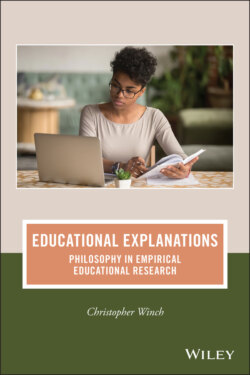Читать книгу Educational Explanations - Christopher Winch - Страница 7
Preface
ОглавлениеThe present writer has been active in the philosophy of education for over thirty five years and an empirical education researcher for thirty. Although I am by no means unique, the combination of the roles of philosopher and empirical educational researcher is fairly uncommon. Despite the widespread critique of empirical educational research within the philosophy of education community I am convinced that I have gained much in knowledge and understanding from both these enterprises and indeed one of the arguments of this book is that they are more closely related than is often supposed. No-one will be convinced of this stance if those who defend it are not prepared to engage in a careful accounting of the strengths and weaknesses of empirical educational research as it is conducted and in a critical appraisal of its presuppositions. This the present book attempts to do.
Without the resources available to philosophy of education, educational policy and practice is likely to remain blind, assuming philosophical positions without being aware of doing so, let alone adopting a critical stance towards them. Philosophy of education, if it ignores the methods and findings of empirical educational research, however flawed or incomplete these may be, has to rely on a ‘commonsense’ vision of educational reality, either based on personal experience or on unexamined assumptions about the way the educational world works. With a few notable exceptions, to be found for example in the work of Richard Pring, D.C. Phillips and Tone Kvernbekk, constructive engagement with empirical educational research on the basis of a willingness to assess its value and to profit from it when it does have valuable insights or findings, is rare. Too often the philosophical arguments against empirical educational research are unconvincing and lack either engagement with or sympathy for what empirical researchers are trying to accomplish. For their part (and partly in reaction to the attitude of some philosophers of education) empirical educational researchers too often neglect the philosophical presuppositions of their work or disregard the possibilities of an empirical investigation of conceptual variation. They often fail to adopt a coherent conceptual framework for thinking about educational issues.
There are good reasons, therefore, for revisiting this troubled academic relationship and to try to effect a more fruitful engagement between the two research communities to the mutual profit not just of them but of educational practices and those who benefit from them. I am well aware of the difficulties of moving individuals from entrenched positions, but, among other things, this book is an attempt to do so.
There are a number of tasks which this book aims to accomplish. First, to establish that empirical educational enquiry should seek after truth wherever possible. Second, to show that empirical educational enquiry aims to present explanations for how and why educational institutions exist and educational processes occur. Third, the nature of educational explanation as a truth-oriented but pragmatic rather than absolutist enterprise is advocated. Fourth, the importance of understanding in terms of conceptual structure, internal meanings and reasons are emphasised as prerequisites of satisfactory educational explanations. Fifth, the preceding four theses are defended through the examination of four case studies of empirical educational research programmes. Sixth and finally, the implications of this account of educational explanation are drawn out for future research programmes and the preparation of teachers.
